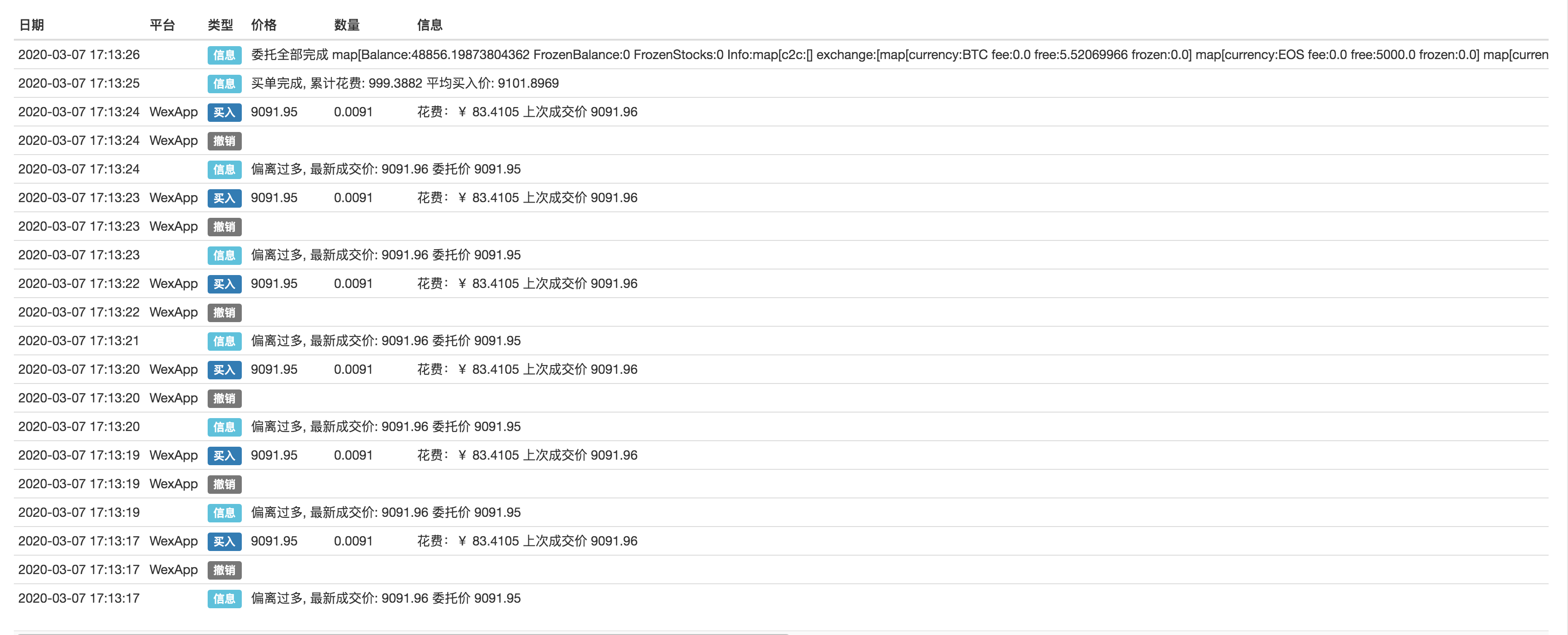Python-Version Eisberg-Kommissionsstrategie
Schriftsteller:Gutes, Erstellt: 2020-07-21 10:21:10, Aktualisiert: 2023-10-26 20:08:29
Dieser Artikel bringt zwei klassische Strategien für die Transplantation: Iceberg-Kommission (Kauf/Verkauf).https://www.fmz.com/square/s:Iceberg/1
Ich zitiere die JavaScript-Version der Iceberg-Kommissions-Handelsstrategie:
Die Iceberg-Kommission bezieht sich auf die Tatsache, dass, wenn Anleger Großtransaktionen durchführen, um eine übermäßige Auswirkungen auf den Markt zu vermeiden, die große Auftragsprovision automatisch in mehrere Provisionen aufgeteilt wird, basierend auf dem aktuellen letzten Kauf / Verkauf 1 Preis und dem vom Händler festgelegten Preis.
Viele Börsen-Handelsseiten verfügen über Iceberg-Kommissioning-Tools, die reich an Funktionen haben, aber wenn Sie einige Funktionen anpassen oder einige Funktionen nach Ihren eigenen Bedürfnissen ändern möchten, benötigen Sie ein flexibleres Tool. Die FMZ-Plattform wurde entwickelt, um dieses Problem korrekt zu lösen. Unser Strategie Square hat nicht zu viele Python-Handelsstrategien. Einige Handler, die Python-Sprache verwenden möchten, um Handelswerkzeuge und -Strategien zu schreiben, müssen sich auf Beispiele beziehen. Daher wurde die klassische Iceberg-Kommissioning-Strategie auf die Python-Version portiert.
Eisbergkommission für Python - Einkauf
import random # Import random number library
def CancelPendingOrders(): # The function of CancelPendingOrders is to cancel all pending orders of the current transaction.
while True: # Loop detection, call GetOrders function to detect the current pending order, if orders is an empty array, that is, len(orders) is equal to 0, indicating that all orders have been cancelled, you can exit the function and call return to exit.
orders = _C(exchange.GetOrders)
if len(orders) == 0 :
return
for j in range(len(orders)): # Traverse the current array of pending orders, and call CancelOrder to cancel the orders one by one.
exchange.CancelOrder(orders[j]["Id"])
if j < len(orders) - 1: # Except for the last order, execute Sleep every time and let the program wait for a while to avoid canceling orders too frequently.
Sleep(Interval)
LastBuyPrice = 0 # Set a global variable to record the the latest buying price.
InitAccount = None # Set a global variable to record the initial account asset information.
def dispatch(): # Main functions of iceberg commission logic
global InitAccount, LastBuyPrice # Reference global variables
account = None # Declare a variable to record the account information obtained in real time for comparison calculation.
ticker = _C(exchange.GetTicker) # Declare a variable to record the latest market quotes.
LogStatus(_D(), "ticker:", ticker) # Output time and latest quotation in the status bar
if LastBuyPrice > 0: # When LastBuyPrice is greater than 0, that is, when the commission has started, the code in the if condition is executed.
if len(_C(exchange.GetOrders)) > 0: # Call the exchange.GetOrders function to get all current pending orders, determine that there are pending orders, and execute the code in the if condition.
if ticker["Last"] > LastBuyPrice and ((ticker["Last"] - LastBuyPrice) / LastBuyPrice) > (2 * (EntrustDepth / 100)): # Detect the degree of deviation, if the condition is triggered, execute the code in the if, and cancel the order.
Log("Too much deviation, the latest transaction price:", ticker["Last"], "Commission price", LastBuyPrice)
CancelPendingOrders()
else :
return True
else : # If there is no pending order, it proves that the order is completely filled.
account = _C(exchange.GetAccount) # Get current account asset information.
Log("The buying order is completed, the cumulative cost:", _N(InitAccount["Balance"] - account["Balance"]), "Average buying price:", _N((InitAccount["Balance"] - account["Balance"]) / (account["Stocks"] - InitAccount["Stocks"]))) # Print transaction information.
LastBuyPrice = 0 # Reset LastBuyPrice to 0
BuyPrice = _N(ticker["Buy"] * (1 - EntrustDepth / 100)) # Calculate the price of pending orders based on current market conditions and parameters.
if BuyPrice > MaxBuyPrice: # Determine whether the maximum price set by the parameter is exceeded
return True
if not account: # If account is null, execute the code in the if statement to retrieve the current asset information and copy it to account
account = _C(exchange.GetAccount)
if (InitAccount["Balance"] - account["Balance"]) >= TotalBuyNet: # Determine whether the total amount of money spent on buying exceeds the parameter setting.
return False
RandomAvgBuyOnce = (AvgBuyOnce * ((100.0 - FloatPoint) / 100.0)) + (((FloatPoint * 2) / 100.0) * AvgBuyOnce * random.random()) # random number 0~1
UsedMoney = min(account["Balance"], RandomAvgBuyOnce, TotalBuyNet - (InitAccount["Balance"] - account["Balance"]))
BuyAmount = _N(UsedMoney / BuyPrice) # Calculate the buying quantity
if BuyAmount < MinStock: # Determine whether the buying quantity is less than the minimum buying quantity limit on the parameter.
return False
LastBuyPrice = BuyPrice # Record the price of this order and assign it to LastBuyPrice
exchange.Buy(BuyPrice, BuyAmount, "spend:¥", _N(UsedMoney), "Last transaction price", ticker["Last"]) # Place orders
return True
def main():
global LoopInterval, InitAccount # Refer to LoopInterval, InitAccount global variables
CancelPendingOrders() # Cancel all pending orders when starting to run
InitAccount = _C(exchange.GetAccount) # Account assets at the beginning of the initial record
Log(InitAccount) # Print initial account information
if InitAccount["Balance"] < TotalBuyNet: # If the initial assets are insufficient, an error will be thrown and the program will stop
raise Exception("Insufficient account balance")
LoopInterval = max(LoopInterval, 1) # Set LoopInterval to at least 1
while dispatch(): # The main loop, the iceberg commission logic function dispatch is called continuously, and the loop stops when the dispatch function returns false.
Sleep(LoopInterval * 1000) # Pause each cycle to control the polling frequency.
Log("委托全部完成", _C(exchange.GetAccount)) # When the loop execution jumps out, the current account asset information is printed.
Eisberg-Kommission für Python - Verkauf
Die Strategie ist die gleiche wie beim Kauf, nur mit einem kleinen Unterschied.
import random
def CancelPendingOrders():
while True:
orders = _C(exchange.GetOrders)
if len(orders) == 0:
return
for j in range(len(orders)):
exchange.CancelOrder(orders[j]["Id"])
if j < len(orders) - 1:
Sleep(Interval)
LastSellPrice = 0
InitAccount = None
def dispatch():
global LastSellPrice, InitAccount
account = None
ticker = _C(exchange.GetTicker)
LogStatus(_D(), "ticker:", ticker)
if LastSellPrice > 0:
if len(_C(exchange.GetOrders)) > 0:
if ticker["Last"] < LastSellPrice and ((LastSellPrice - ticker["Last"]) / ticker["Last"]) > (2 * (EntrustDepth / 100)):
Log("Too much deviation, the latest transaction price:", ticker["Last"], "Commission price", LastSellPrice)
CancelPendingOrders()
else :
return True
else :
account = _C(exchange.GetAccount)
Log("The buy order is completed, and the accumulated selling:", _N(InitAccount["Stocks"] - account["Stocks"]), "Average selling price:", _N((account["Balance"] - InitAccount["Balance"]) / (InitAccount["Stocks"] - account["Stocks"])))
LastSellPrice = 0
SellPrice = _N(ticker["Sell"] * (1 + EntrustDepth / 100))
if SellPrice < MinSellPrice:
return True
if not account:
account = _C(exchange.GetAccount)
if (InitAccount["Stocks"] - account["Stocks"]) >= TotalSellStocks:
return False
RandomAvgSellOnce = (AvgSellOnce * ((100.0 - FloatPoint) / 100.0)) + (((FloatPoint * 2) / 100.0) * AvgSellOnce * random.random())
SellAmount = min(TotalSellStocks - (InitAccount["Stocks"] - account["Stocks"]), RandomAvgSellOnce)
if SellAmount < MinStock:
return False
LastSellPrice = SellPrice
exchange.Sell(SellPrice, SellAmount, "Last transaction price", ticker["Last"])
return True
def main():
global InitAccount, LoopInterval
CancelPendingOrders()
InitAccount = _C(exchange.GetAccount)
Log(InitAccount)
if InitAccount["Stocks"] < TotalSellStocks:
raise Exception("Insufficient account currency")
LoopInterval = max(LoopInterval, 1)
while dispatch():
Sleep(LoopInterval)
Log("All commissioned", _C(exchange.GetAccount))
Strategiebetrieb
Verwenden Sie WexApp, um den Austauschtest zu simulieren:
Kauf:

Verkauf:

Die Strategie Logik ist nicht kompliziert. Wenn die Strategie ausgeführt wird, wird es dynamisch platzieren und stornieren Aufträge auf der Grundlage der Strategie Parameter und den aktuellen Marktpreis. Wenn die Transaktionssumme / Münze Zahl erreicht oder nähert sich der Parameter-Einstellungsnummer, die Strategie stoppt. Der Strategie-Code ist sehr einfach und geeignet für Anfänger. Interessierte Leser können es ändern und eine Strategie entwerfen, die ihren Handelsstil passt.
- Quantitative Praxis der DEX-Börsen (2) -- Benutzerhandbuch für Hyperflüssigkeiten
- DEX-Börsen Quantitative Praxis ((2) -- Hyperliquid Benutzerhandbuch
- Quantitative Praxis der DEX-Börsen (1) -- dYdX v4 Benutzerhandbuch
- Einführung in Lead-Lag-Arbitrage in Kryptowährungen (3)
- DEX-Börsen Quantitative Praxis ((1)-- dYdX v4 Benutzerhandbuch
- Einführung der Lead-Lag-Suite in der Kryptowährung (3)
- Einführung in Lead-Lag-Arbitrage in Kryptowährungen (2)
- Einführung der Lead-Lag-Suite in der digitalen Währung (2)
- Diskussion über den externen Signalempfang der FMZ-Plattform: Eine Komplettlösung für den Empfang von Signalen mit integriertem Http-Service in der Strategie
- FMZ-Plattform: Erforschung von Signalempfangsstrategien für externe Netzwerke
- Einführung in Lead-Lag-Arbitrage in Kryptowährungen (1)
- Hinzufügen eines Wecker zur Handelsstrategie
- OKEX-Futures-Kontrakt-Hedging-Strategie mit C++
- Handelsstrategie auf Basis des aktiven Geldflusses
- Verwenden Sie das Trading-Terminal-Plug-in, um den manuellen Handel zu erleichtern
- Strategie für den Handel mit quantitativen Typing-Raten
- Ausgleichsstrategie und Netzstrategie
- Multi-Roboter-Lösung für die gemeinsame Nutzung von Marktnoten
- Implementierungsschema für Roboter mit WeChat-Push-Nachrichten
- Ausgleichs- und Netzstrategien
- Graphische Martingale-Handelsstrategie
- Die Logik des Futures-Handels mit Kryptowährungen
- Grundform der ZDZB-Strategie
- Mehrrobotermarkt-Sharing-Lösungen
- Modellierung und Analyse von Bitcoin-Volatilität basierend auf dem ARMA-EGARCH-Modell
- Lösung des Problems der Genauigkeit der numerischen Berechnung im JavaScript-Strategie-Design
- Ich zeige Ihnen, wie man eine Python-Strategie in eine lokale Datei einkapselt.
- FMEX-Handel ermöglicht eine optimale Optimierung des Auftragsvolumens Teil 2
- Der Handel auf der FMEX ermöglicht eine optimale Optimierung des Auftragsvolumens
- Analyse und Realisierung von Rohstofffutures Volumen-Fußabdruck-Diagramm
- FMEX-Sortierung freischaltet Optimum unter Optimierung